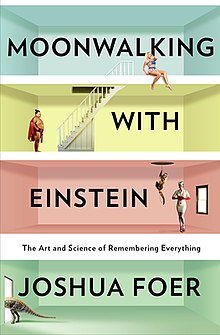Moonwalking with Einstein by Joshua Foer
What is the value of learning and memories in modern days and if mnemonic techniques can help us remember more?
Polish title: "Jak zostałem geniuszem pamięci. O sztuce i technice zapamiętywania"

Memory contest #
The book starts with memory contests and decided to try next year.
In the process, Joshua learns mnemonic techniques and does the job of a journalist. He dives deeper into any memory related issues. That was the first time reading more about savants. But even a healthy person can remember too much. If you damage the wrong part of your brain you won't make any new memories. Those issues can break lives.
While most of the savants have a hard time with everyday tasks. They can do tasks impossible for most of us. Remembering days in the calendar or remember facts or random numbers easily.
The last group is the mnemonists. The book focuses on the most eccentric ones. They try to make a living out of memory techniques with different levels of accomplishment.
Mnemotechniques #
I like how you can learn a little bit about memory techniques while reading but it never goes into teaching mode. Most of them are from ancient Rome or medieval books. There are two techniques that you learn in more detail:
- Visual associations
- Memory palace
1. Visual associations #
First I want to add a disclaimer that there are studies indicating that while they help in the short term it may confuse you in the long term. Use with caution.
The idea is to create an associated image for the thing that you want to remember. The more senses you can add to it the better. More associations in your brain.
2. Memory palace #
It's a fancy name for using spatial memory. Homo sapiens have pretty remarkable spatial memory.
The standard idea is to imagine your home. But, any place you know well-street, park or museum is fine. In every room put one thing that you want to remember. Later on, go the same way and look for the things that you stored there.
End result #
At the end of the book, you learn that the techniques are not practical in a day to day situations. Rarely it will make more sense to use them when you can add a reminder on your phone.
What is worth of learning and memories? #
One thing that the books forces you to think about is how important is it to know things. We all read about stuff on the internet and vaguely remember anything. What if you need to use it?
Is what you read on social media reliable? How can you tell? The best answer is that you have to know the basics. You have to remember them.
When books took over the world you didn't need to store books in your head. Now a lot of people (myself included) remember just enough to know what to google for. It seems like the best use of your time and it gets troubling only when you don't even know that you can google something. But, you can't make anything creative and noteworthy with only shallow knowledge... If creativity is making connections then you need to first have your brain filled with ideas. How can we do that without remembering them?
Practical? #
I have to thank the book for giving me motivation. I started looking for other books about learning.
Want to learn more?
Sign up to get a digest of my articles and interesting links via email every month.